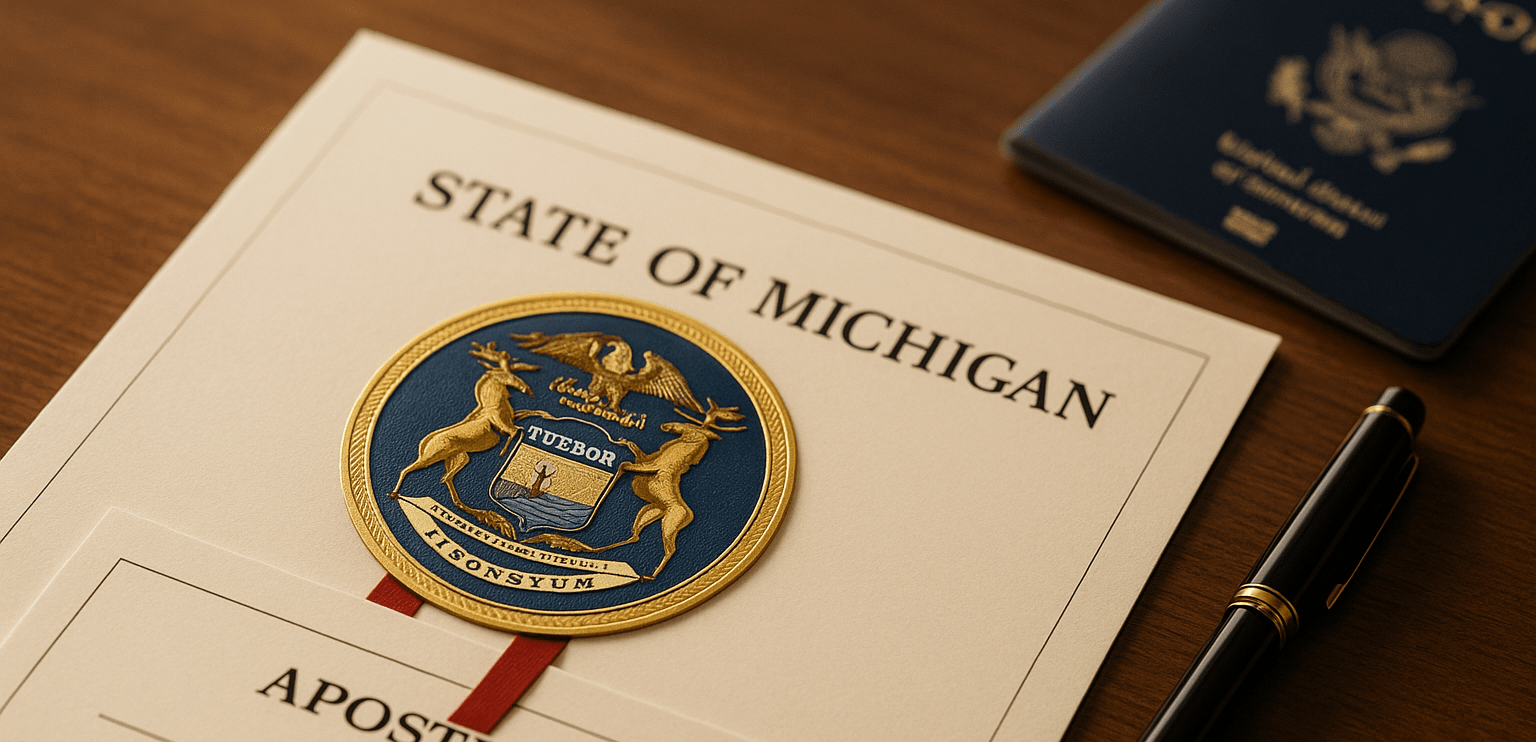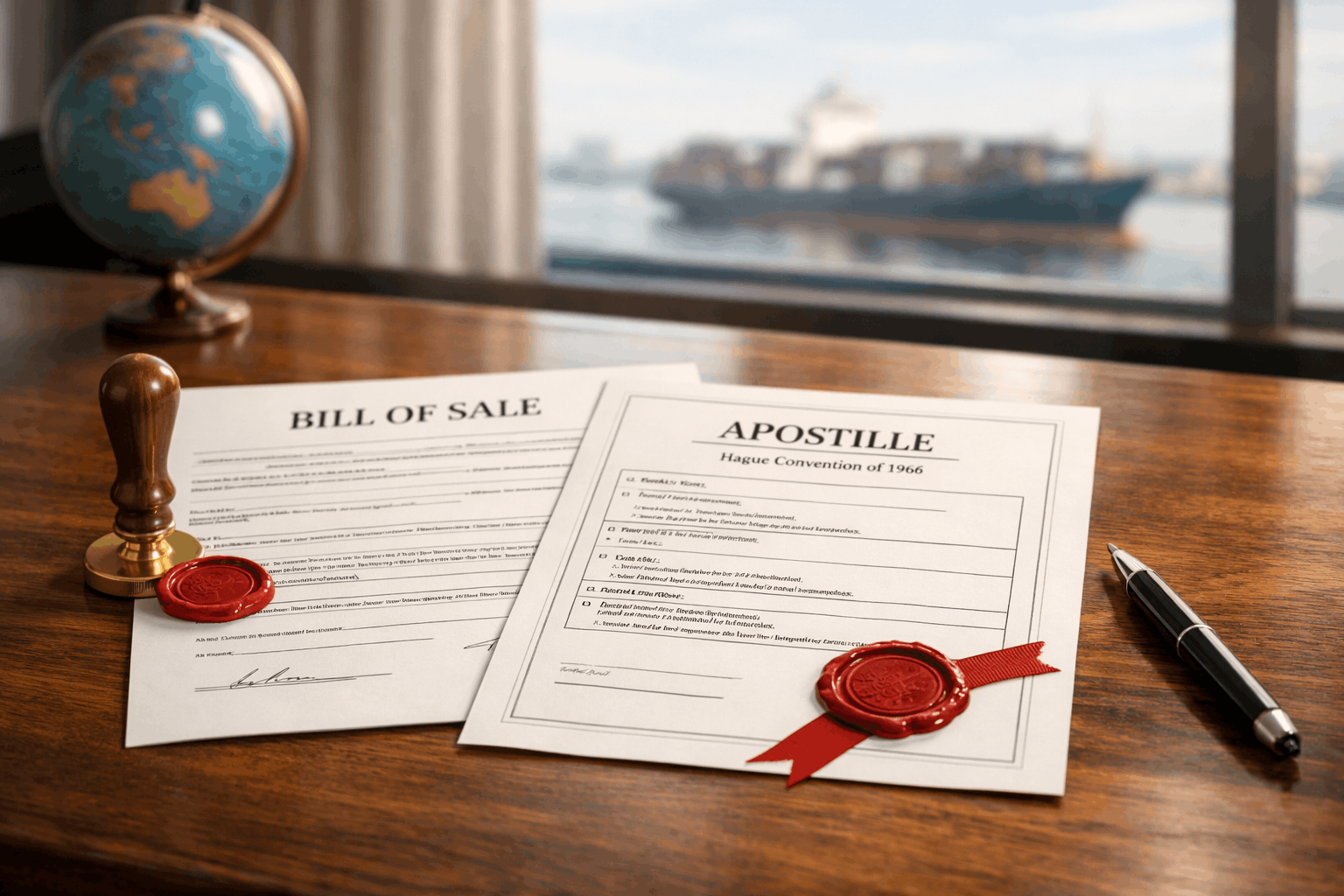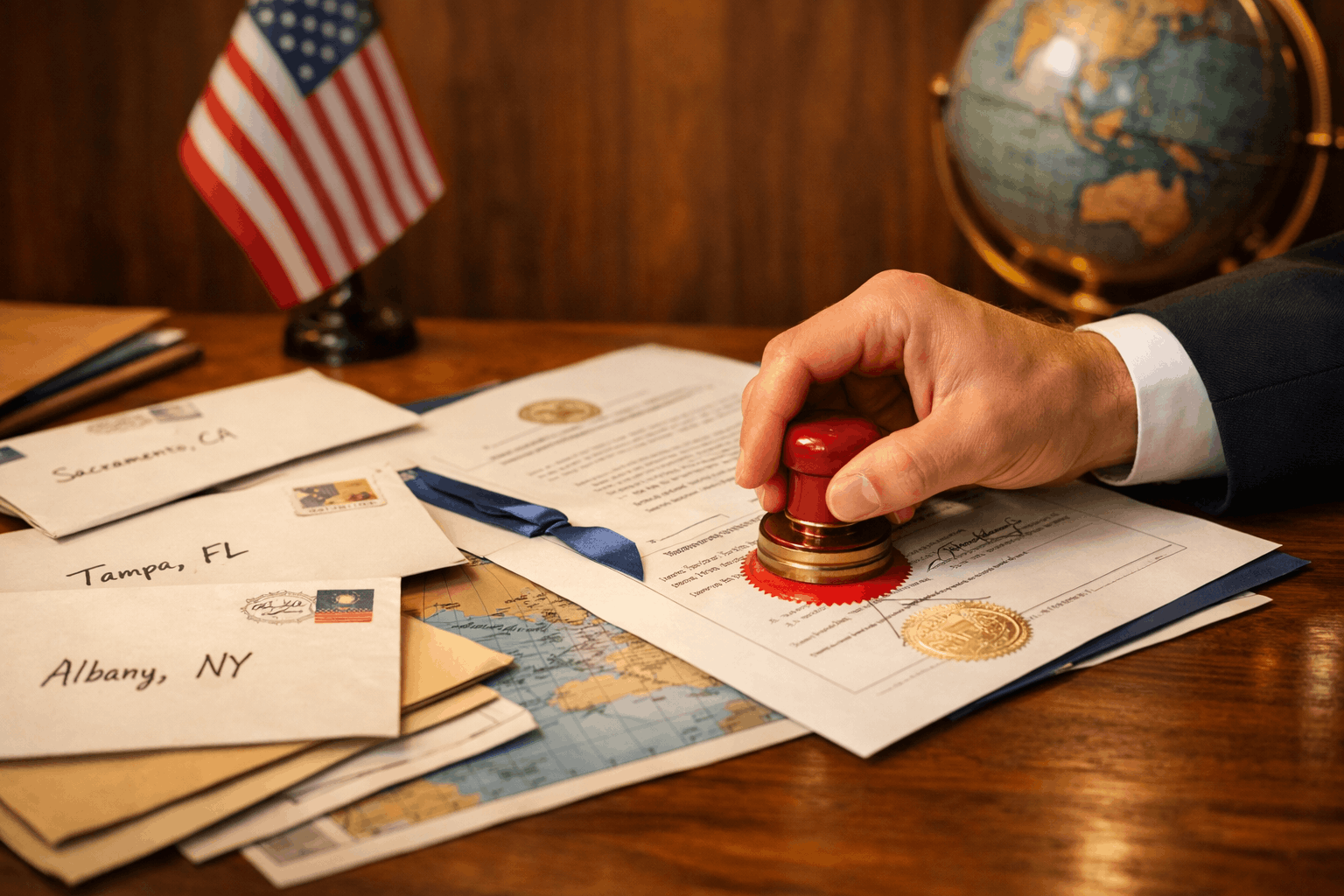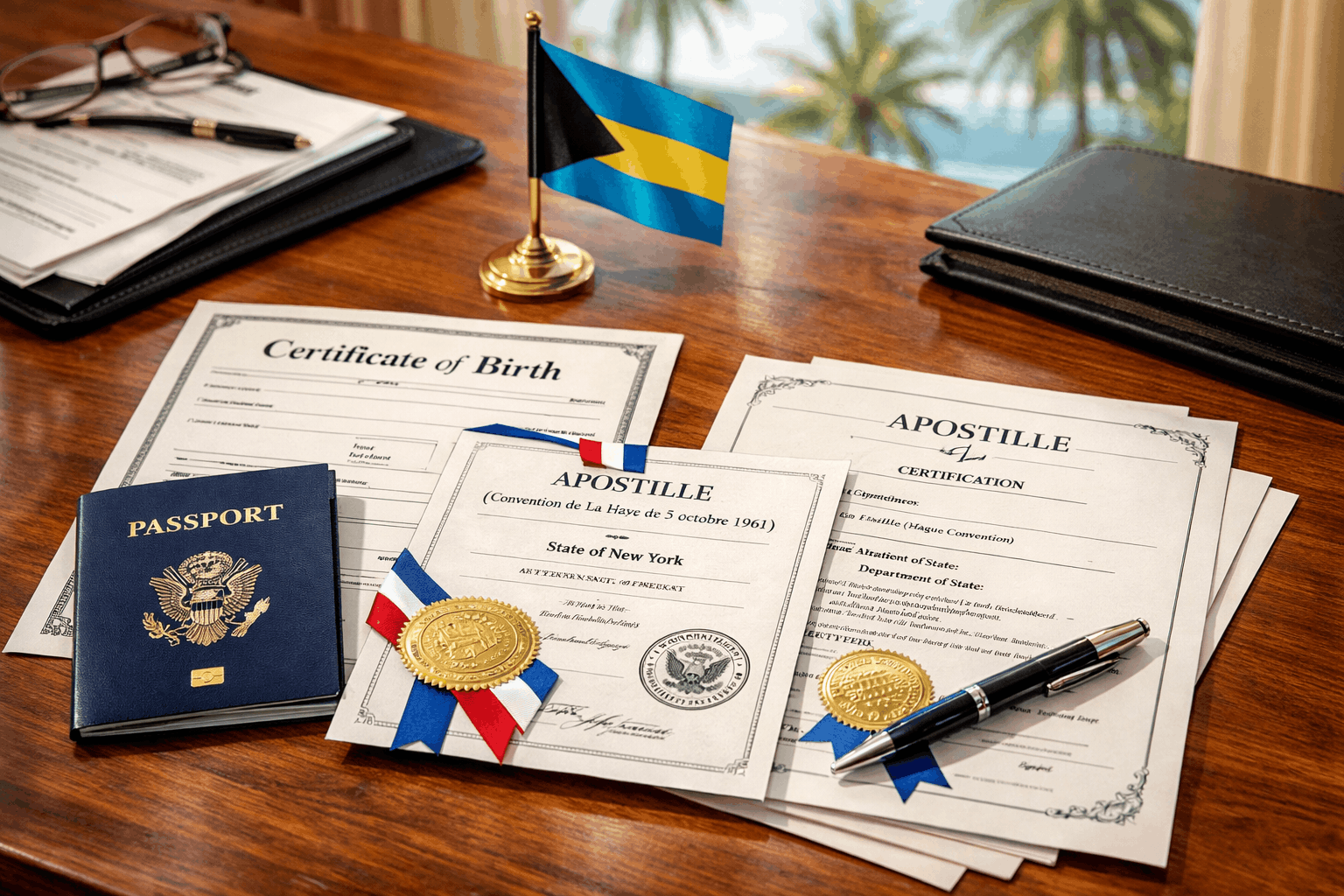
How to Get Your Michigan Birth Certificate Apostille: A Step-by-Step Guide
Have you ever tried to present your personal documents abroad, but hit a bureaucratic wall in the end? From starting a teaching career to organizing a wedding, whichever your exciting journey is, you’ll need an apostilled birth certificate in Michigan to prove your identity. This guide clarifies the Michigan apostille process, turning complicated paperwork into manageable steps.
Why You May Need an Apostille for a Michigan Birth Certificate
You often have your vital records authenticated when planning to use them outside the United States. The apostille is a form of authentication required by countries participating in the Hague Convention. This certification helps secure your paper’s international recognition, clearing the way for smooth legal proceedings overseas.
International Use and Legal Recognition
An apostille for your birth certificate serves as a formal approval from the Michigan Department of State verifying the document’s legitimacy for use in other countries. Without it, foreign authorities have no way to confirm if your birth certificate is authentic. In the worst case, they may reject it for legal purposes, leading to your entire international plan being postponed or canceled.
Common Scenarios
A Michigan apostille becomes essential in several life events that cross the U.S. borders, including:
- Immigration: Applying for a visa, residency permit, or dual citizenship requires an apostilled birth certificate as evidence of your birthplace.
- Adoption abroad: Adopting a new member to your family from overseas often starts with presenting your birth certificate to adoption agencies.
- Foreign marriage: Most local authorities validate your identity and marital status through an apostilled birth certificate when you tie the knot abroad.
Proper authentication streamlines acceptance and prevents legal hiccups when you pass through customs or government offices with your document.
How the Destination Country Plays a Role
The destination country where you intend to use your birth certificate determines if you need an apostille or another method of authentication. Nations that are part of the Convention accept the apostille immediately without question. Non-members, on the other hand, require the record to be legalized at their consulate office.
Step-by-Step Process to Get the Apostille in Michigan
Now that you know why an apostilled birth certificate from the Michigan state office is necessary, it’s time to get into the practical steps. With little preparation and following our step-by-step instructions, you can successfully navigate everything and mitigate oversights. Here’s how to get it done:
Order or Obtain the Certified Birth Certificate From Michigan
The first step before making an apostille request is to obtain a certified copy of your birth certificate. This is typically issued by the Michigan State Registrar or a county/city clerk’s office. Note that scans, photocopies, or uncertified copies will be rejected upfront — so don’t use these versions for your apostille request.
Check for Any Required Endorsements or County Clerk Certification
Some birth certificates, particularly those issued by town clerks that don’t fall under the city clerk designations for Wayne, Oakland, or Macomb counties, may need extra certification from the county clerk to be eligible for the apostille. Always check your document to see which state official signed it, as it helps you determine your next move.
Submit Your Certificate to the Correct State Office
All Michigan apostille requests must be directed to the Michigan Department of State’s Office of the Great Seal. The two acceptable methods of submission are by mail or in person. Mail submission is the standard processing option, giving you the convenience of sending your package via a registered mailing service. If you have tight deadlines, hand delivery is faster, but you’ll have to make an appointment in advance. Arrange your documents perfectly to avoid a wasted trip.
Payment, Processing Times, and Tracking Your Application
The starting fee for apostille processing in Michigan is $1 per document. You should expect 1 to 2 weeks for the timeline, which may change depending on the office workload. Expedited services provided by third-party agencies can speed up the process and return an apostille in 1 to 3 business days. Though the state office doesn’t offer online tracking, expert services might be able to send you updates.
Receiving the Apostilled Document and the Next Steps
Based on your preference, you will receive your apostille in the mail or have it available for pickup. The certificate is attached to your birth record, so don’t separate them. The last step is to forward it to the requesting foreign authority or bring it with you abroad, whether for marriage, adoption, or other official reasons.
What If the Destination Country Is Not a Hague Convention Member?
If the destination where you send your birth certificate isn’t part of the Convention, the document must undergo full legalization instead. This path entails extra layers of verification, including certification at the DOS and final legalization at that country’s embassy. It’s crucial to contact the receiving authority first to inquire about their specific requirements and use a professional service when time is of the essence to ensure your Michigan birth certificate won’t be denied its rightful use.
Checklist Common Mistakes to Avoid
Seamless international acceptance hinges on preventing simple yet costly slip-ups. Here’s a quick checklist to run through before starting the apostille process and submitting your birth certificate abroad:
- Certified document check: You must have a certified copy from the state or county, not a photocopy.
- Submission errors: Ensure you’re sending the package to the Michigan Department of State, not any other state’s offices. All seals must be present and legible, and request forms must be official and up-to-date.
- Recipient research: Always tailor your submission to meet the receiving authority’s expectations — some may have rules on document age, translations, and additional certifications.
By carefully verifying these details, you’ll greatly improve your chances of smooth recognition of your Michigan birth certificate in another country.
Your Global Passport to Legal Acceptance
If you have reached this line, congratulations! Now, you’re equipped with everything you need to authenticate your birth certificate in Michigan for acceptance worldwide. Feeling overwhelmed or simply want an error-free process the first time? No worries — reach out to our experts today so we can handle the legwork for you! Our company guarantees your next big adventure awaits without bureaucratic hurdles getting in the way.
FAQ
Got questions? Here are answers to some of the most frequent concerns about authenticating birth certificates in Michigan.
Can I get an apostille if my Michigan birth certificate is a photocopy or an uncertified copy?
No. Photocopies or unofficial versions will be rejected, since the entire apostille process relies on authenticating official signatures and seals. Only certified copies appropriately issued by a Michigan authority are eligible for an apostille.
How long is the apostille valid for?
Technically, an apostille is perpetually valid unless the underlying document has an expiration date. Moreover, if the receiving government has a policy on how old your record can be, such as within the last 3 months, ensure you obtain a certified copy and apostille it accordingly.
What happens if the destination country rejects the apostilled document?
If it’s unfortunately rejected, you first need to inquire about the reason. Commonly, rejections happen due to missing endorsements, outdated records, or issues with translations. You may have to reprocess the apostille, and we’re available to help you troubleshoot these complex scenarios.
Do I need to translate the document after getting the apostille?
Generally, you don’t need to present a translation for the apostille. Only do this in cases when the destination country specifically asks you to translate it after the apostille process.
Can someone else submit on my behalf for the Michigan apostille process?
Yes. A third party, like a friend or an expert service, can submit a request and collect the apostille for you. Just make sure they understand the process and closely follow Michigan’s submission guidelines for mail-in or in-person requests.





